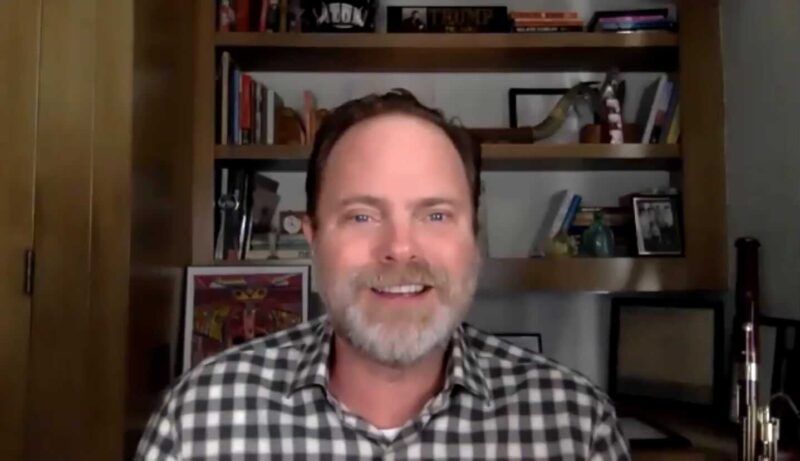
Trinity College Law Society (LawSoc) has come through with some of the most high-profile guests hosted by any Trinity society this year. With the likes of Stephen Fry, Niall Horan and Minister for Higher Education Simon Harris all receiving the Praeses Elit award, last night’s recipient Rainn Wilson fit right in. Actor, writer, producer, philanthropist and all-round icon Wilson had a lifetime of anecdotes and a few pearls of wisdom to share with the 100 plus attendees.
Joining the Zoom from his home in America, Wilson seemed nervous in the beginning, breaking the ice with jokes such as: “I didn’t know you had law in Ireland.” However, he quickly got into the swing of things once LawSoc auditor Jonathon Boylan asked him about acting.
Something that even Wilson’s biggest fans may not know is that acting is in his blood. Wilson’s mother was also an actor, during which time she had an affair with a theatre director, resulting in Wilson’s parents divorcing when he was a toddler. “That was why my dad had this kind of wariness about acting”, Wilson explained. “But I thought that was a pretty fascinating story. There was a genetic component to this thing obviously.”
Wilson’s career-defining role as Dwight Schrute in The Office spanned nine years and eight seasons. The character known for his quirkiness and sometimes mean spirit was a pillar of the long-running show. In terms of embodying the role, Wilson spoke about creating a crucial balance between wackiness and authenticity: “In my theatre work, you create a character inside out and no matter how absurd a character you’re playing, you try to give real stakes, heightened emotion, a heart, connection – try and see the world through that character’s eyes, even if you’re playing an outrageous character.” He commended the show’s writers for never trying to make Dwight “a simple stereotype”, which Wilson believes made the character so complex and lasting.
After eight years of making The Office, it wasn’t the network that cancelled the show, but a mutual agreement among its cast and crew. “In terms of saying goodbye to the show, it was just time to end”, he recalled. “I mean, we loved it, we were getting paid very well… we loved our characters”, but after eight years of playing those characters, Wilson said everyone felt it was time to move on. “It was time to let it go and at the same time none of us were bitter about it”, he added. “We hadn’t gone on too long. It was just the perfect amount of time, so we all pretty much felt the same way about that.”
When The Office ended, Wilson continued acting while taking advantage of the many new opportunities that came his way. “So many doors open up to you when you become well-known as an actor”, he explained. “Certainly you’re making more money and you have a louder voice.”
Wilson used some of that fame and fortune for good, starting a non-profit organisation with his wife in 2007 called Lide Haiti. “The more we researched we realised that girls education is really the number one and best way to change the world.” The organisation currently has 13 locations in Haiti where it works with over 800 girls, teaching arts and literacy, running health programmes and offering scholarships.
Wilson has also kept up writing, producing and acting since co-founding digital media company SoulPancake in 2009. “It’s a digital media company for social good”, he explained. “We make uplifting content that brings people together, that challenges us as human beings to kind of dig deeper and have real discussions on what it is to be human, life’s biggest questions.” The company has made TV specials and launched shows such as Kid President, among others.
All recipients of the Praeses Elit award, which is awarded to people who can “empower students in their everyday lives”, are asked what advice they would give to the young people in attendance. In his reply, Wilson thought about his own student days and said he wishes he didn’t sell himself short. He said it takes “a kind of Donald Trump narcissism to think you’re much better at something than you actually are” and encouraged students to “always know that you can do a lot more than you think you can”.
“Keep broadening your vision, broaden your scope, strive for more, push yourself and don’t let yourself and your fears get in the way of making a huge and tremendous impact.”






